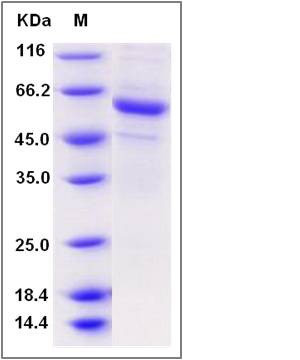Human PSG6 / PSG10 Protein (His Tag)
CGM3,PSBG-10,PSBG-12,PSBG-6,PSG10,PSG12,PSG6,PSGGB
- 100ug (NPP2438) Please inquiry
| Catalog Number | P13808-H08B |
|---|---|
| Organism Species | Human |
| Host | Baculovirus-Insect Cells |
| Synonyms | CGM3,PSBG-10,PSBG-12,PSBG-6,PSG10,PSG12,PSG6,PSGGB |
| Molecular Weight | The secreted recombinant human PSG6 consists of 400 amino acids and predicts a molecular mass of 45.2 KDa. The apparent molecular mass of the protein is approximately 58 Kda in SDS-PAGE under reducing conditions due to glycosylation. |
| predicted N | Gln 35 |
| SDS-PAGE |  |
| Purity | > 87 % as determined by SDS-PAGE |
| Protein Construction | A DNA sequence encoding the human PSG6 (Met 1-His 424) (NP_001027020) was expressed, with a C-terminal polyhistidine tag. |
| Bio-activity | |
| Research Area | |
| Formulation | Lyophilized from sterile 20mM Tris, 500mM NaCl, pH 7.4 1. Normally 5 % - 8 % trehalose, mannitol and 0.01% Tween80 are added as protectants before lyophilization. Specific concentrations are included in the hardcopy of COA. |
| Background | PSG6 is a pregnancy-specific glycoprotein(PSG). PSGs are secreted proteins which are produced by the rodent and primate placenta and play a critical role in pregnancy success. The levels of PSGs are highest during the third trimester of pregnancy, a time marked by the most profound suppression of MS disease attacks. PSGs regulate T-cell function. The regulation of T-cell function during pregnancy is likely the result of significant hormonal changes and may well involve immunoregulatory proteins derived from the placenta. Pregnancy specific glycoproteins (PSGs) are the most abundant placentally derived glycoproteins in the maternal serum. PSG1, PSG6, PSG6N, and PSG11 induce dose-dependent secretion of anti-inflammatory cytokines by human monocytes. Human and murine PSGs exhibit cross-species activity. |
| Reference |
